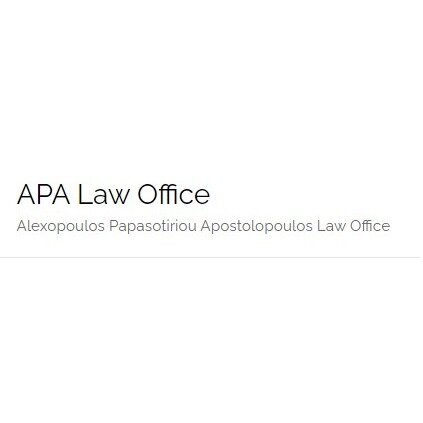Best Oil, Gas & Energy Lawyers in Greece
Share your needs with us, get contacted by law firms.
Free. Takes 2 min.
Or refine your search by selecting a city:
List of the best lawyers in Greece
About Oil, Gas & Energy Law in Greece
Greece, located at the crossroads of Europe, Asia, and Africa, occupies a strategically important position for the energy sector. With its entry into the European Union, Greece has been striving to align its energy policies with EU regulations the past two decades. The Greek energy market has been gradually liberalized, fostering increased investment in oil, gas, and renewable energies. The country’s geographical position makes it a critical transit route and hub for energy resources flowing to Europe, increasing the significance of legal matters in this domain. Legal frameworks shaping the energy sector in Greece encompass regulatory compliance, environmental considerations, and contractual obligations that facilitate the exploration, production, and distribution of energy.
Why You May Need a Lawyer
Engaging in the oil, gas, and energy sectors in Greece could necessitate legal guidance under various circumstances. Individuals and companies may seek legal assistance for the following reasons:
- Understanding and navigating complex regulatory landscapes and compliance with EU and Greek energy legislation.
- Drafting, negotiating, and enforcing contracts related to energy production, distribution, and sales.
- Managing disputes arising from energy transactions, including those related to exploration rights, joint ventures, and partnerships.
- Addressing environmental concerns and ensuring compliance with environmental impact assessments and sustainability standards.
- Handling issues related to land acquisition, permits, and zoning dilemmas arising from energy projects.
- Intellectual property rights concerning new energy technologies and innovations.
- Securing financing and investment through government incentives, subsidies, and grants available in the energy sector.
Local Laws Overview
The legal infrastructure governing oil, gas, and energy in Greece is primarily influenced by European Union directives and domestic legislation. Here are some key aspects:
- Regulatory Compliance: Compliance with EU directives related to energy efficiency, renewable energy, and climate change is integral. This includes adhering to targets set under the EU’s Green Deal.
- Licensing and Permits: A structured licensing system for exploration and production exists, managed by the Hellenic Hydrocarbon Resources Management (HHRM) and other local agencies.
- Renewable Energy Projects: Special emphasis on renewable energy laws to support Greece's transition to sustainable sources, such as wind, solar, and hydroelectric power.
- Environmental Regulations: Strict policies guide environmental protection in energy projects, including Environmental Impact Assessments (EIAs) required for large-scale projects.
- Investment Laws: Various incentives and regulations are in place to promote foreign and domestic investments in the energy sector.
Frequently Asked Questions
1. What is the role of Hellenic Hydrocarbon Resources Management (HHRM) in Greece?
HHRM is responsible for managing the exploration and production rights of hydrocarbons in Greece. It oversees concession agreements and ensures adherence to licensing terms.
2. Are there specific laws for renewable energy in Greece?
Yes, Greece has specific laws encouraging the development of renewable energy, aligning with EU directives to promote sustainable energy sources, and reduce carbon emissions.
3. What taxes are applicable in the oil and gas industry in Greece?
Taxes in the oil and gas sector may include corporate income tax, value-added tax (VAT), and royalties on extracted resources. Incentives may also apply for strategic investments.
4. Can foreign investors participate in the Greek energy market?
Yes, foreign investors can participate, and Greece has specific laws and incentives to attract foreign investment, especially in renewable energy and infrastructure projects.
5. What environmental regulations are in place for energy projects?
Stringent regulations govern the assessment of environmental impacts through EIAs, particularly for large energy projects, ensuring sustainable development and compliance with EU standards.
6. What is the main regulatory body for energy in Greece?
The Regulatory Authority for Energy (RAE) regulates the energy market, ensuring compliance, efficiency, and transparency across all sectors of the energy industry.
7. How does Greece support energy efficiency?
Greece implements EU directives, offering grants, subsidies, and incentives for projects improving energy efficiency in industries, transportation, and buildings.
8. Are there opportunities in offshore energy exploration in Greece?
Yes, Greece offers opportunities for offshore exploration, particularly in the Ionian Sea and south of Crete, with specific legal frameworks in place to support these activities.
9. What should I consider when entering a joint venture in the energy sector?
Important considerations include clearly defined partnership terms, regulatory compliance, intellectual property protections, and dispute resolution mechanisms.
10. What role does the Greek government play in the energy sector?
The government facilitates regulatory oversight, investment incentives, policymaking, and international cooperation to promote a balanced and sustainable energy sector.
Additional Resources
To support your legal endeavors in the oil, gas, and energy sectors in Greece, consider reaching out to the following resources:
- Hellenic Ministry of Environment and Energy
- Hellenic Hydrocarbon Resources Management (HHRM)
- Regulatory Authority for Energy (RAE)
- Invest in Greece Agency
- Greek Association of Renewable Energy Producers (GAREP)
- European Union Energy Portal
Next Steps
If you require legal assistance within the oil, gas, and energy industries in Greece, consider these steps:
- Research: Conduct thorough research on local laws, industry requirements, and available legal services in Greece.
- Consult a Specialist: Engage with a lawyer specializing in energy law to help you navigate the complexities and nuances specific to your situation.
- Contact Relevant Authorities: Reach out to HHRM, RAE, or other pertinent organizations for specific guidance or clarification on regulations.
- Contract Review: Have a legal professional review contracts and agreements to ensure they meet local legal standards and protect your interests.
- Networking: Connect with industry professionals, associations, and forums for insights and guidance from those experienced in the Greek energy sector.
Lawzana helps you find the best lawyers and law firms in Greece through a curated and pre-screened list of qualified legal professionals. Our platform offers rankings and detailed profiles of attorneys and law firms, allowing you to compare based on practice areas, including Oil, Gas & Energy, experience, and client feedback.
Each profile includes a description of the firm's areas of practice, client reviews, team members and partners, year of establishment, spoken languages, office locations, contact information, social media presence, and any published articles or resources. Most firms on our platform speak English and are experienced in both local and international legal matters.
Get a quote from top-rated law firms in Greece — quickly, securely, and without unnecessary hassle.
Disclaimer:
The information provided on this page is for general informational purposes only and does not constitute legal advice. While we strive to ensure the accuracy and relevance of the content, legal information may change over time, and interpretations of the law can vary. You should always consult with a qualified legal professional for advice specific to your situation.
We disclaim all liability for actions taken or not taken based on the content of this page. If you believe any information is incorrect or outdated, please contact us, and we will review and update it where appropriate.
Browse oil, gas & energy law firms by city in Greece
Refine your search by selecting a city.

















